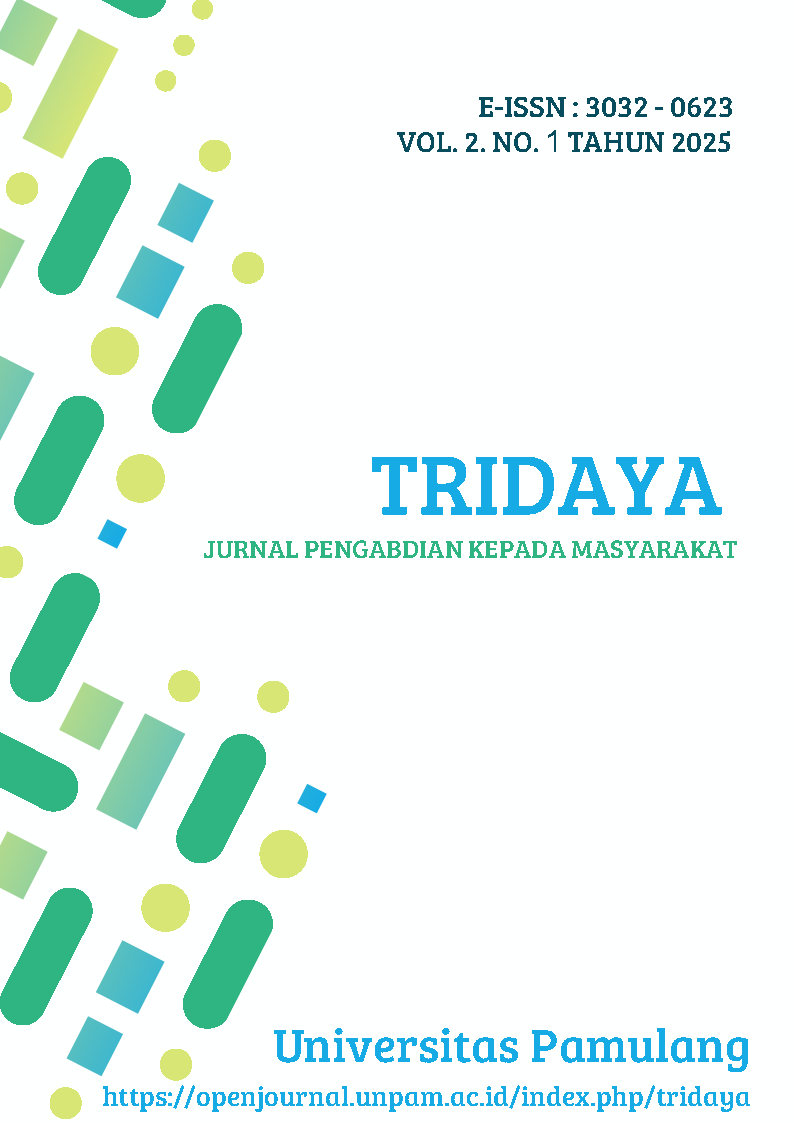IMPLEMENTASI GREEN ECONOMIC DAN MANAJEMENN BERBASIS SEKOLAH UNTUK MENDUKUNG PEMBANGUNAN BERKELANJUTAN
DOI:
https://doi.org/10.32493/tridaya.v2i1.47369Keywords:
Green Accounting, environmental accounting, sustainability, environmental impactAbstract
Green Accounting is a branch of accounting science that focuces on estimating and reporting the impact of economic activities on the environment. Green Accounting aims to incorporate environmental elements into traditional financial accounting anjd notification systems, thereby providing a more compherensive view of company performance, not in terms of revenue, but also in terms of environmental sustainability. The benefits of Green Accounting increase sustainable decision making. Information resulting from Green Accounting can help companies make more sustainable bussniness decisions, such as investing in environmentally friendly technology and reducing excessive use of natural resources. Even though Green Accountingbhas many benefits, its implementation still faces challenges, namely that are no clear an globally structrured and regulations for Green Accounting, so the PKM team can use varios different methods and approaches, namely by providing counseling about application of Green Accounting to SMKN 1 CIRUAS. The methods used is by approaching the students and delivering the material as well as discussing it. This PKM activity was carried out on May 30 2024 abd was attended by male/female students majoring in Accounting at SMKN 1 CIRUAS. Despite several challenges, Green Accounting is an important step towards more sustainable accounting. By counting to develop standards continuing to develop standards an regulations, increasing the availability of data and information, and finding cost-effective solutions, Green Accounting can help the PKM team archive sustainable development goals and create a more sustainable future.
References
Aviyanti, R. D. (2022). Peran Jurusan Green Economy Dapat Mewujudkan Pembangunan Lingkungan Berkelanjutan: Green Economy. Owner: Riset dan Jurnal Akuntansi, 6(2), 1336-1341.
Alwasi, F. T., Fadhilah, E. A., Nurohmah, W., & Rustini, T. (2023). GREEN EDUCATION DI SEKOLAH DASAR DALAM UPAYA MENGEMBANGKAN SIKAP PEDULI LINGKUNGAN MENUJU GREEN ECONOMY. Didaktik: Jurnal Ilmiah PGSD STKIP Subang, 9(5), 3201-3215.
Kusuma, N. R., & Ida Hamidah, N. F. (2022). Pengelolaan Sumber Daya Alam Berbasis Ekonomi Hijau Dalam Perspektif Syariah Untuk Mendukung Pembangunan Berkelanjutan Di Indonesia. Konferensi Nasional Studi Islam (KONASI), 1, 142-153.
Hapsoro, N. A., & Bangun, K. (2020). Perkembangan pembangunan berkelanjutan dilihat dari aspek ekonomi di indonesia. Lakar: Jurnal Arsitektur, 3(2), 88-96.
Syahwildan, M., Setiawan, I., & Hariroh, F. M. R. (2023). Peran Green Economy Terhadap Pembangunan Berkelanjutan Di Indonesia. Lentera Pengabdian, 1(02), 163-171. PUTRISARIRA, W. (2021). perekonomian dua sektor.
Rumambi, F. J. (2023). DAMPAK LINGKUNGAN TERHADAP KUALITAS PENDIDIKAN: PERAN MANAJEMEN LINGKUNGAN BERKELANJUTAN. JMBA Jurnal Manajemen dan Bisnis, 9(2), 10-19.v
Sitorus, L., & Lasso, A. H. (2021). Pendidikan karakter peduli lingkungan melalui pembiasaan dan pembudayaan di Sekolah Menengah Pertama. Edukatif: Jurnal Ilmu Pendidikan, 3(5), 2206-2216.
Azmal, S., Harmain, H., & Juliati, Y. S. (2023). Kedudukan Profesi Akuntan Dalam Perwujudan Sustainable Development Goals (SGD’s) 2030 Berbasis Green Technology. Reslaj: Religion Education Social Laa Roiba Journal, 5(6), 3540-3554.
Antasari, D. W. (2020). Implementasi green economy terhadap pembangunan berkelanjutan di kota Kediri. Jurnal Ekonomi Pembangunan STIE Muhammadiyah Palopo, 5(2), 80-88.





